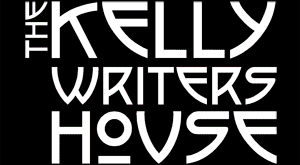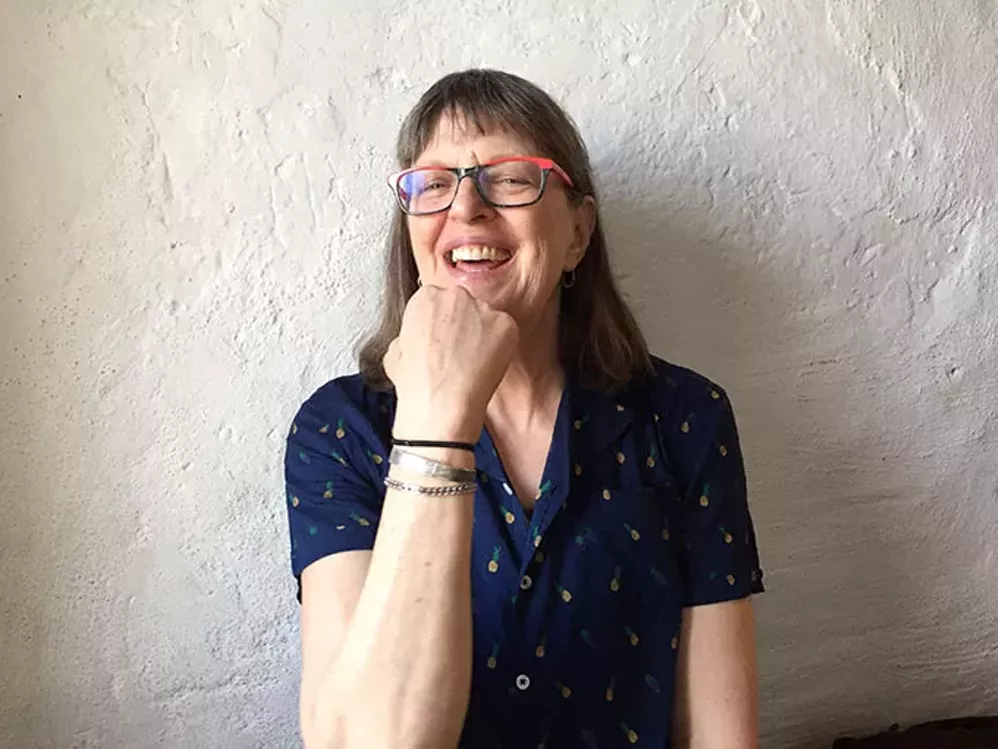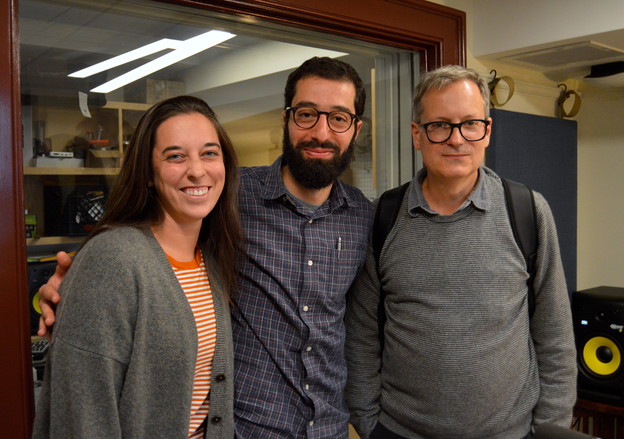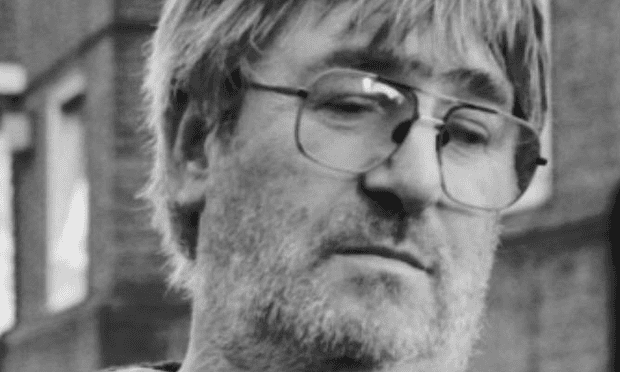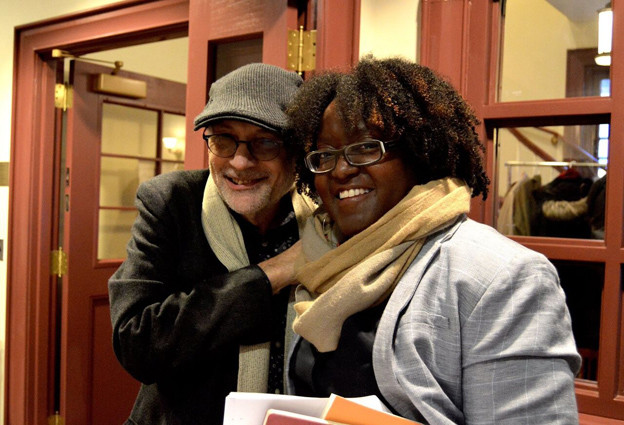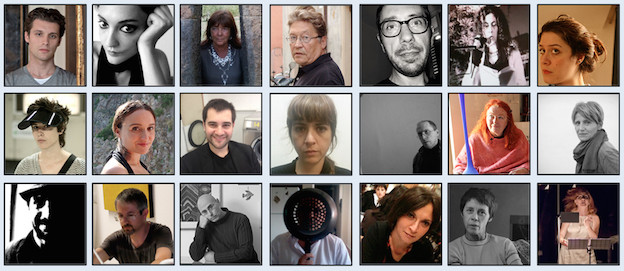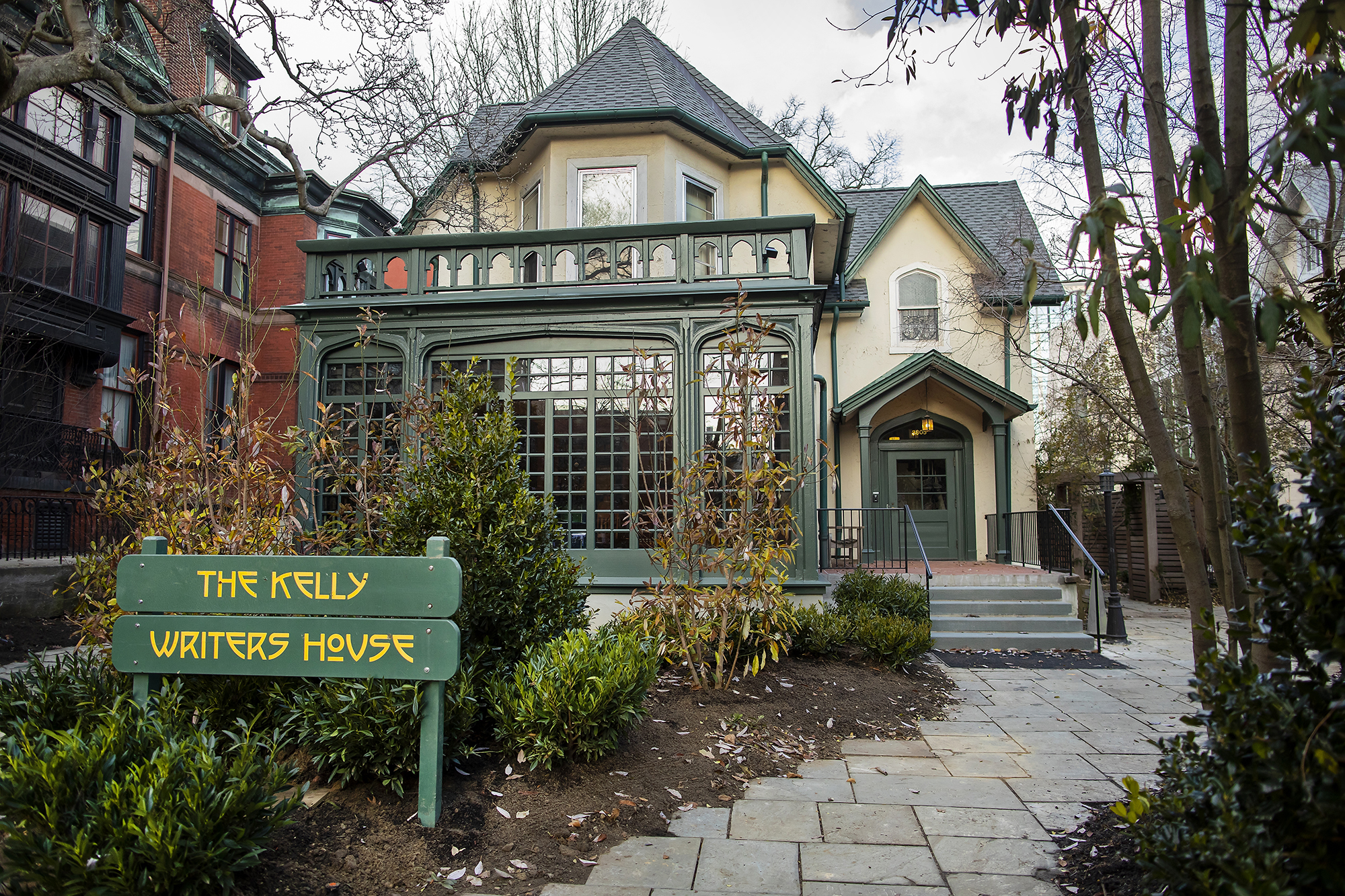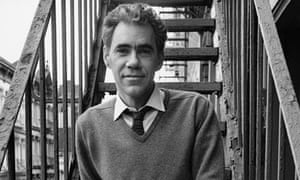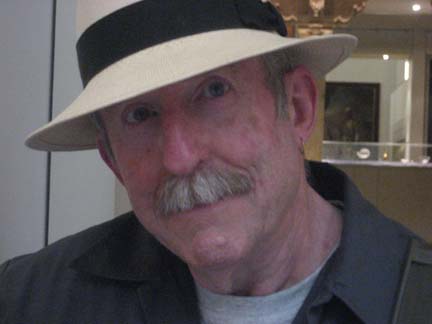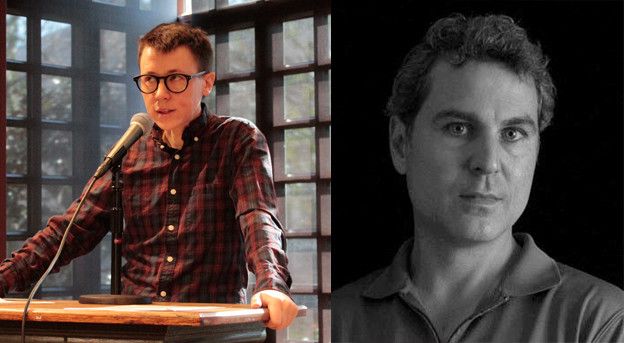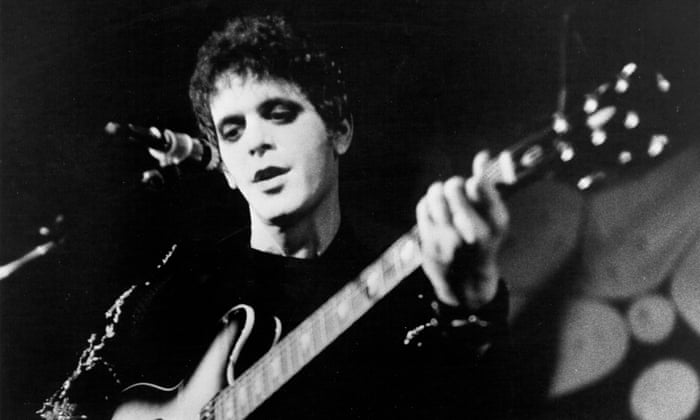PennSound Daily (original) (raw)
Two More Virtual KWH Events Wednesday 4/1
Thanks to everyone who joined us for last night's Kelly Writers House Fellows event with Erín Moure. If you missed the live reading and conversation, it's been archived for your viewing pleasure on the KWH YouTube page. We have two more very exciting virtual events coming up this Wednesday that we wanted to share with our listeners.
First, from 11:00AM–1:00PM EDT (15:00 UTC), we'll have the next in a series of ModPo TA "office hours" with Jess Shollenberger will leading a two-hour conversation on Marianne Moore's poem called "Poetry." The thread for that discussion is here and you'll find a thread on the ModPo site here with links to the full text of the poem, a discussion of the poem recorded at the Moore archive at Philadelphia's Rosenbach Museum, and a ModPo team conversation "riff[ing] on Moore's 'imaginary gardens with real toads in them.'" If you have questions about this or any other ModPo-related content, you're welcome to e-mail the team at modpo@writing.upenn.edu.
Then, at 8:00PM EDT (00:00 UTC), KWH will host "Soviet Diaspora Poetry by The Cheburashka Collective" via Zoom. The Cheburashka Collective — "a growing community of women and non-binary writers whose work has been shaped by immigration from the Soviet Union to the US" — will be well-represented in an online reading hosted by Natalia Smirnov that will feature poetry by Marina Blitshteyn, Julia Kolchinsky Dasbach, Ruth Madievsky, Luisa Muradyan, Gala Mukomolova, Alina Pleskova, and Olga Livshin. You can read full bios of all of the participants and find a link to the online event here via the Kelly Writers House calendar.
We hope you'll consider joining us for one or both of these events as we continue to do our best to keep fostering connections within the poetry community in the midst of this stressful era of social distancing, and please keep an eye out for future events, which we'll be sure to announce here on PennSound Daily as details are finalized.
Reminder: Erín Moure KWH Fellows Presentation Monday 3/30 at 5:30 EDT
We wanted to offer our listeners one more reminder that our Kelly Writers House Fellows presentation featuring Canadian poet and translator Erín Moure will take place virtually this Monday, March 30th at 5:30PM EDT (9:30PM UTC).
As Lily Applebaum, KWH's Assistant to the Faculty Director announced last week, "No in-person attendance is possible for this program, but you will be able to stream live from any connection via the Kelly Writers House YouTube channel. The program will, of course, also be recorded and uploaded for your future viewing." Her note continues:
For the first 45 minutes or so, Erín will read from her work. Then, we'll shift into a ~45 minute question and answer portion where Fellows program coordinator Lily Applebaum and course TA Anna Strong Safford will be relaying YOUR questions to Erín live on air. You can ask your question in three ways:
- by tweeting with the hashtag #ErinMoureLive, in advance, during the broadcast, or both
- by writing an e-mail to Lily at with something in the subject line like "A question for Erín," preferably in advance of the broadcast
- by commenting on the YouTube video during the broadcast
You can tune in via KWH-TV or our YouTube Channel. If you'd like to receive up to the minute e-mail information about this event, as well as a reminder with a direct link, please write to whfellow@writing.upenn.edu to sign up. Everyone is welcome to tune in and no RSVP is required to view.
PoemTalk #146: on Robert Frost's "Mending Wall"
Today, we released a very exciting new program from the PoemTalk Podcast Series — episode #146 in total — which addresses Robert Frost's iconic poem "Mending Wall." For this special program, host Al Filreis was joined by a panel consisting of (from left to right) ModPo coordinator Anna Strong Safford, poet Ahmad Almallah, and the host of Slate Culture Gabfest, Stephen Metcalf.
Filreis begins his PoemTalk blog post on this episode by addressing the poem's immense cultural baggage: "What hasn't already been said about this poem? Well, to our ears at least, this conversation goes in several unusual and, we think, fascinating new directions. What exactly is the nature of the poem's (or anyway the speaker's) cultural conservatism? Can the wall really be read geopolitically? Is it more about what is being walled out than walled in? Do the stalwart iambs themselves form a wall that is hard for readers to get across? Are the gaps in the wall wide enough for new readers to get through?" From there, he goes on to the poem's provenance as well as the history of the recording under discussion here. You can read more, and browse a selection of "Mending Wall"-centric resources from ModPo and the Kelly Writers House by clicking here. The full PoemTalk archives, spanning more than a decade, can be found here.
Update on the Lawrence Upton Estate
Late last month we asked for your help in preserving the archives of influential British poet Lawrence Upton by supporting a petition organized by cris cheek — which received a total of 676 signatures. Today we're happy to provide a very positive update from cheek, who writes:
Good News! Thanks to everyone for supporting the petition. We gathered more than 600 signatures in a couple of days and its weight plus collective stature has helped. This week the coroner's office, social services and the police did not prevent access to the house being granted. A will witnessed by two signatories has been found. There is still a massive project ahead to begin archiving and conserving the material, our primary concern. But that work can now begin. Big thanks to all of you, to the persistence of Tina Bass, John John Levack Drever, Robert Hampson and all in the support group.
We couldn't be happier to see a good end come to this potential tragedy and share our appreciation with all of our listeners who might've seen our post and signed on to the petition. One other bit of auspicious news worth sharing is that Upton has been memorialized with an obituary in The Guardian by Robert Hampson, published on March 12th.
This is a great opportunity to remind you of the new PennSound author page that we assembled from various recordings scattered throughout our archives. There, you'll find two appearances on Martin Spinelli's program Radio Radio, the 2010 film The Sound of Writers Forum, Upton and John Drever performing "Speculative Scores" at the 2011 E-Poetry Festival at SUNY-Buffalo, and video from the Polycovalia festival at Birkbeck College in June 2011, where "Lawrence Upton, Chris Goode, cris cheek, Holly Pester and others revisit work by Sumner, bpnichol, Basinski, Cobbing, MacLow and other scores, poems and possibilities." Click here to start listening to these materials.
LINEbreak Turns 25
Charles Bernstein recently posted on social media about the silver anniversary of LINEbreak, the first of several radio programs that he's produced over the past twenty-five years:
In 1995, Martin Spinelli and I did a series of 30-minute radio conversations and readings with poets and writers. It was one of the first programs to be distributed nationally by satellite to public radio stations, so a precursor to Podcasts. I went on to a make a related series of programs, Close Listening. All are available free to stream or download on PennSound. All in all, there have been conversations and readings by 133 poets, writers, and artists.
He then goes on to list that impressive full roster of participants for both programs, which we'll replicate below. You can click on the names of each series to browse their complete archives. We congratulate Charles and the many other folks who've helped produce these shows over the year on an auspicious anniversary and look forward to many more episodes in the years to come!
LINEbreak: Bruce Andrews, Paul Auster, Robert Creeley, Raymond Federman, Ben Friedlander, Madeleine Gins, Loss Pequeño Glazier, Barbara Guest, Carla Harryman, Lyn Hejinian, Susan Howe, Karen Mac Cormack, Jackson Mac Low, Steve McCaffery, Lance and Andrea Olsen, Jena Osman, Ted Pearson, Jerome Rothenberg, Leslie Scalapino, Ken Sherwood, Ron Silliman, Peter Straub, Luci Tapahonso, Dennis Tedlock, Fiona Templeton, Cecilia Vicuna, Hannah Weiner, Ben Yarmolinsky
Close Listening: Will Alexander, David Antin, Rae Armantrout, John Ashbery, Khin Aung Aye and James Byrne, Caroline Bergvall, Bill Berkson, Mei-mei Berssenbrugge, Christian Bok, Régis Bonvicino, Lee Ann Brown, Colon Browne, Phong Bui, Stanley Cavell, Miles Champion, Abigail Chlld, Wystan Curnow, Michael Davidson, Alan Davies, Samuel R. Delany, Dubravka Djuric, Arkadii Dragomoshchenko, Johanna Drucker, Rachel DuPlessis, Clayton Eshleman, Eduardo Espina, Al Filreis, Norman Fischer, Allen Fisher, Richard Foreman, Dominique Fourcade, Tonya Foster, Sergei Gandlevsky, Jorgen Gassilewiski, Ernie Gehr, Peter Gizzi, Kenneth Goldsmith, Dmitry Golynko, Ted Greenwald, Robert Grenier, Mimi Gross, Anna Hallberg, Henry Hills, Erica Hunt, Peter Inman, Ken Jacobs, Patricia Spears Jones, Pierre Joris, Lawrence Joseph, Douglas Kearney, Myung Mi Kim, George Kuchar, Joel Kuszai, Gerritt Lansing, Norbert Lange, Ann Lauterbach, Hank Lazer, Tan Lin, Alan Loney, Zeyar Lynn, Nathaniel Mackey, Daphne Marlatt, Bernadette Mayer, Thomas McEvilley, Jerome McGann, Douglas Messerli, Peter Middleton, Drew Milne, Tracie Morris, Erin Mouré, Eileen Myles, Redell Olsen, Maggie O'Sullivan, Michael Palmer, Julie Patton, Bruce Pearson, Ted Pearson, Bob Perelman, Marjorie Perloff, Nick Piombino, Jean-Michel Rabaté, Tom Raworth, Naomi Replansky, Joan Retallack, Cia Rinne, Lisa Robertson, Kit Robinson, Claude Royet-Journoud, Jay Sanders, Mira Schor, Harold Schimmel, Alexander Skidan, Susan Stewart, Peter Straub, ko ko thett, Mónica de la Torre, John Tranter, Richard Tuttle, Tyrone Williams, Elizabeth Willis, Keith Waldrop, Rosmarie Waldrop Fred Wah
Two Upcoming ModPo SloPo Online Discussions with Filreis, Knittle
As we mentioned in our last note, we're continually looking for opportunities to expand our virtual offerings for those longing for a little poetic discussion in the midst of this season of self-quarantine. Today we have two new events to announce, both of which will take place this week as part of ModPo's off-season SloPo series.
The first of these conversations will be led by Al Filreis (shown at left) and will take place on Tuesday, March 24, from 11 AM to 1 PM EDT. It will focus on Gwendolyn Brooks' poem, "The Chicago Picasso," and here you'll find a link to the ModPo thread for this poem, along with the text of the poem, a ModPo video on the poem, and Brooks' comments on her own work. As Filreis notes, "You do *not* need to watch the video or read her statement in order to participate in this 'live' 2-hour discussion on March 24 at 11 AM (Philadelphia time). You only have to read the poem!"
Then, on Thursday, March 26, from 5 to 7 PM EDT, Davy Knittle (shown at right) will host a 2-hour discussion of Elizabeth Willis' poem titled "Survey." Links to the ModPo thread on the poem, its complete text, audio of Willis reading it, and a short video discussion can all be found here.
We welcome you to join us for these special online events and keep an eye out for more virtual programming as the semester progresses.
Erín Moure's KWH Fellows Program Rescheduled as a Virtual Event
When we announced that this spring's programming at the Kelly Writers House was cancelled due to COVID-19 we also noted that one event we hoped to be able to still present in a virtual format was this year's Kelly Writers House Fellows reading and conversation with Canadian poet and translator Erín Moure. Today we have the details for that rescheduled event, via Lily Applebaum, KWH's Assistant to the Faculty Director:
This is Lily Applebaum from the Kelly Writers House, with a special announcement! Of course we have been impacted by the chaos of the last few weeks and have postponed or cancelled all of our in-person events. But I'm thrilled to announce that we will still host Writers House Fellow Erín Moure for a poetry reading and Q&A that is completely virtual. No in-person attendance is possible for this program, but you will be able to stream live from any connection via the Kelly Writers House YouTube channel. The program will, of course, also be recorded and uploaded for your future viewing.
So please tune in on Monday, March 30 at 5:30PM EST, via KWH-TV or our YouTube Channel.
For the first 45 minutes or so, Erín will read from her work. Then, we'll shift into a ~45 minute question and answer portion where Fellows program coordinator Lily Applebaum and course TA Anna Strong Safford will be relaying YOUR questions to Erín live on air. You can ask your question in three ways:
- by tweeting with the hashtag #ErinMoureLive, in advance, during the broadcast, or both
- by writing an e-mail to Lily at with something in the subject line like "A question for Erín," preferably in advance of the broadcast
- by commenting on the YouTube video during the broadcast
If you'd like to receive up to the minute e-mail information about this event, as well as a reminder on with a direct link, please write to mailto:whfellow@writing.upenn.edu to sign up. Of course anyone can tune in and no RSVP is required to view.
And from the bottom of my heart and on behalf of all my colleagues on the KWH staff, thank you for your patience as we move carefully and intentionally through these difficult times. We're doing our best to maintain the interactivity and the community you've come to expect, and that we take great pride in providing, through our in-person events, and translating that to our virtual events. As for future Writers House events that may be moving to the virtual, please stay tuned for information as those event organizers will make more specific announcements.
Thank you again, I so hope you'll tune in on 3/30 at 5:30PM for this reading and Q&A event!
All my best,
Lily
New at J2: Charles Bernstein's Close Listening Interview with Tonya Foster
Here's some exciting new content posted at Jacket2 this morning: "The Performance of Freedom," an edited transcript of Charles Bernstein's Close Listening conversation with Tonya Foster. Recorded on June 18, 2013 at Studio 215 in New York and presented by Clocktower Radio in collaboration with PennSound, the interview portion of this program was transcribed by Mariah Macias and edited for publication by the two participants.
As Kelly Liu explains in her introductory note, "The conversation, between Charles Bernstein and Tonya Foster, discusses Foster's then-forthcoming poetry collection, A Swarm of Bees in High Court (Belladonna*, 2015), as well as topics surrounding Foster's writing process and African American poetry communities such as Umbra and Cave Canem." Early in the conversation, Bernstein asks Foster to "talk a little bit about the role that sound plays in [her] work." He continues:
There's lots of sound associations and inchoate sounds in your work, and a lot of it seems to move through progressions of sounds. I noted just one example: "salt and startled." Which of course, if you just scramble the letters of startled, you get salt in there — and yet it's not an expected kind of rhyme, assonance, and alliteration — but you seem to have a lot of things like that. And at one point you say toward the end of your reading: "follow thought and sound." How do you follow thought and sound?
"Well, I feel like I hear when I'm writing, and that for me, the sort of sound of language — I’m not even clear what I’m about to say," she begins. "I feel like the sound of language produces meanings in unexpected ways, and that sometimes a word will sound right without my necessarily thinking about what it means — that musically it feels right, which makes no sense, 'cause I can't sing. But that's how I write for me." She concludes, "The thought is so much about sound, what I've heard, and what I'm hearing."
You can follow their full conversation here and click here to listen as you read along.
PennSound Italiana
I thought it would be good, as we all struggle to adjust to our new reality, for us to start this week by highlighting our resources from one of the countries hardest hit by the COVID-19 pandemic: Italy. Our PennSound Italiana anthology page, lovingly edited by Jennifer Scappettone, offers our listeners a stellar survey of contemporary Italian poetry. When we launched the page five years ago, Scappettone offered an introduction to the collection in an essay published at Jacket2. Here's how she starts off:
We seek over the course of this ongoing project to offer a broad sense of the field, filling in the substantive gaps in global access to Italian poetry (as both written and sonic text — even within Italian borders), and expanding awareness of its range of practitioners, with an emphasis on marginalized and experimental voices of the twentieth and twenty-first centuries. It is an effort — a unique one, in our reckoning — to "liberate" the spectrum of Italian poetry for as broad a public as possible through audio and video recordings, given that the publishing industry and the translation market are endangered and/or blinkered enough to condemn a significant swath of both historical and contemporary innovation to oblivion. As such, this live archive extends the task of PennSound writ large.
Regular updates have been made to the page over the intervening years and we're always eager to have more work from Scappettone to share with our listeners. At present, the page has recordings from Gian Maria Annovi, Mariasole Ariot, Maria Attanasio, Luigi Ballerini, Gherardo Bortolotti, Franco Buffoni, Maria Grazia Calandrone, Alessandra Cava, Laura Cingolani, Corrado Costa, Elisa Davoglio, Milo De Angelis, Alessandro De Francesco, Antonella Doria, Giovanna Frene, Florinda Fusco, Samir Galal Mohamed, Marco Giovenale, Milli Graffi, Mariangela Guatteri, Giulio Marzaioli, Andrea Inglese, Eva Macali, Enzo Minarelli, Tommaso Ottonieri, Angela Passarello, Jonida Prifti / Stefano Di Trapani (a.k.a. Acchiappashpirt), Laura Pugno, Andrea Raos, Marilena Renda, Lidia Riviello, Amelia Rosselli, Rosaria Lo Russo, and Andrea Zanzotto. Click here to start browsing PennSound Italiana, and don't forget that Scappettone's Jacket2 intro includes some of her highlights from the collection, including background information on the historical nature of each recording.
KWH Programming Canceled for the Remainder of Spring 2020
Earlier today, Kelly Writers House Director Jessica Lowenthal shared this message with the community regarding programming for the remainder of the semester:
As many of you will have heard by now, Penn has extended its spring break by one week and will then migrate all courses online.
Following this news, Kelly Writers House will postpone or cancel all scheduled live/in-person events and activities through the end of the semester.
Ongoing digital projects, including online book groups and ModPo mini-courses, will continue as planned. And we look forward to sharing news about additional virtual or digital-only events we hope to host!
We'll share any further developments in this space and you can keep an eye on the Kelly Writers House calendar for updates regarding programming. Take note that Erín Moure's much-anticipated Kelly Writers House Fellows reading and conversation will be combined into one virtual event to be held via livestream, which you can watch via KWH-TV or our YouTube channel. The finalized date and time for that event will be announced in the near future. Stay tuned and stay safe!
Happy Birthday to Joe Brainard!
March 11 would have been the seventy-ninth birthday of second generation New York School titan (or "soi-disant Tulsa School," depending on who you ask) titan Joe Brainard. Our Joe Brainard author page is anchored by four readings from the St. Mark's Poetry Project recorded between 1971 and 1981. They include copious excerpts from his magnum opus, I Remember, along with selections from his journals and numerous other pieces such as "Thanksgiving," "Insomnia," "Worry Wart," "The Zucchini Problem," "Today (Monday, February 23rd, 1981)," and "Sick Art." Additionally, you'll find excerpts from Train Ride read at SFSU in the mid-1970s and a stellar reading with Bill Berkson at Intersection for the Arts in 1971, plus more I Remember selections taken from a 1974 Giorno Poetry Systems session and a recording session at home in Calais, VT in 1970.
Filmmaker Matt Wolf (who directed the much-lauded Wild Combination, a documentary on the life of avant-pop cellist Arthur Russell) is back with an exciting new project — I Remember: A Film About Joe Brainard — a haunting and gorgeous meditation that deftly intertwines both imagery and audio to create a compelling tribute to the artist and author. We're very glad to see Brainard commemorated in such grand fashion, and happier still that Wolf was was kind enough to share an exclusive clip with PennSound. In it, longtime friend, collaborator and confidante Ron Padgett discusses Brainard's early development as a visual artist and his ability to work confidently in a wide variety of media and forms, never becoming complacent in one style.
You'll find all of the recordings mentioned above by clicking here. It's also worth checking out Andrew Epstein's 2014 Brainard birthday post on his New York School-focused blog, Locus Solus, which features excerpts from a tribute poem by James Schuyler, excerpts from I Remember "thinking about birthdays, and our frustrating efforts to understand 'time,'" and a few examples of his artwork. Brainard's birthday is also a wonderful reason to revisit the Make Your Own Brainard site, where you can make your own collages using fragments from his visual work.
Tom Raworth: Two Newly Segmented Recordings
We bring this week to a close with two newly segmented recordings by Tom Raworth.
The earlier of these readings took place at Vancouver's Kootenay School of Writing on November 17, 1998. Raworth's twenty-minute set was comprised of thirteen poems in total, including "Intellectual Compost 4," "Death to a Star," "60 Words I've Never Used Before," "Unable to Create Carrier," "Crowded with Otiose Passengers," "Cat Van Cat," "Differences in Common," "No Hard Feelings," "Pyrophoric," and "Ingot We Trust."
"The Third Retainer;" "Ah, the Poetry of Miss Parrot's Feet Demonstrating the Tango;" "You've Ruined My Evening, You've Ruined My Life;" "Euro'd;" "Human Warmth;" "Wit Wither;" "There Are Few People Who Put on Any Clothes;" "Noise;" "Why I Am Not a Mathematician;" "Drone of Your Own;" "Coffee, Tobacco, Hemp;" "Where Does Light Speed?;" "Sound Pound;" "Close the Loop on This;" "Olympic Games;" "Asyndeton;" "How to Patronize a Poem;" and "Ice Quakes."
You can listen to these recordings by clicking on the links above. As you might imagine, PennSound's Tom Raworth author page is home to a collection of recordings well befitting this prolific and influential poet, with literally hundreds of individual tracks spanning nearly four decades, including his two entries in the Rockdrill series, Close Listening and PoemTalk programs, and numerous readings in the US, UK, and Canada.
PennSound Podcast #69: Rodney Koeneke and Davy Knittle
We've just released a new episode in the PennSound Podcast Series, our 69th episode overall. Nick Plante has all the info you need to know about this show over at Jacket2:
In September 2018 Davy Knittle hosted poet Rodney Koeneke in the Wexler Studio to discuss his book, Body & Glass (Wave Books, 2018). Their conversation touches on Koeneke's writing process and use of pronouns as a "distancing technique," the role of poetry — particularly experimental forms — in America today, and how joy might emerge from work about loss. In the podcast, the two also examine the traditions that poetry assembles for itself, drawing comparisons between modernists like Joyce and contemporary poets. Koeneke recorded readings for PennSound as well.
That session showcases poems from Body and Glass as well as Koeneke's 2014's book Etruria (also published by Wave Books). Running twenty-six minutes, it includes the poems "Larry's House of Brakes," "in the backlands of the provence," "tarnish the coppice, punk autumn," "the new sobriety," "scott walker sings," "humber, severn, mersey, thames, and ouse," "another hapless functionary," "he continually puts autumn in his writing," and nineteen more titles. You can listen to that recording and many more, going back as far as 2004, by clicking here. To listen in on their conversation, click here. You can browse the full archive of PennSound Podcasts by clicking here.
Celebrating Lou Reed's Birthday with a New Author Page
Legendary songwriter Lou Reed would have turned 78 today. In his honor, we've created a new PennSound author page for him, which is home to his 2012 appearance at our own Kelly Writers House as the honored guest of that year's Blutt Singer-Songwriter Symposium. That hour long conversation with Anthony DeCurtis, has very usefully been segmented thematically, including individual tracks covering "his early interest in rock and roll and songwriting," "writing rock lyrics about drug culture and the ignored netherworld," "his constantly shifting artistic focuses," "his formal education," "improvisation in relation to his concept albums," and "being unaware of his influence" among others, along with comments on friends, collaborators, and influences, including Delmore Schwartz, Andy Warhol, the Velvet Underground, Laurie Anderson, Leonard Cohen, Edgar Allan Poe, Bob Dylan, and Metallica.
When Reed died of liver disease in November 2013, we paid tribute to him here on PennSound Daily, making an argument for his literary bonafides:
From his earliest recordings, Reed established the archetype of literate rock star, blending the urban dystopianism of William Burroughs and Hubert Selby, Jr. with the sensibilities of his Syracuse University mentor, Delmore Schwartz (to whom he dedicated "European Son," the incendiary closing track of 1967's The Velvet Underground & Nico), and while listeners typically relish his memorable (if bedraggled) characters and offbeat sense of narrative, he was certainly capable of formal innovations every bit as adventurous as the stories he told. Consider, for example, the binaural poetics of "The Murder Mystery," (off of the Velvet's 1969 self-titled record, later published as a standalone poem in The Paris Review) alongside John Ashbery and Ann Lauterbach's two-channel realization of the former's "Litany," or Jackson Mac Low's and John Giorno's experiments with multi-track renderings of their works. Brian Eno famously claimed that everyone who originally bought the first Velvet Underground album went out and started a band, and without a doubt there are also a great many poets who were first moved to pick up a pen by Reed's lyrics.
Seven years later, his presence is still sorely missed. You can listen to Reed's Blutt conversation by clicking here.
